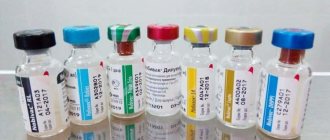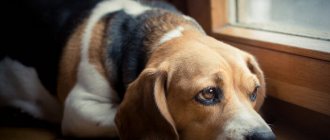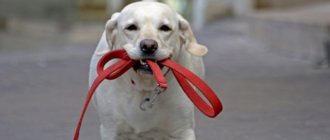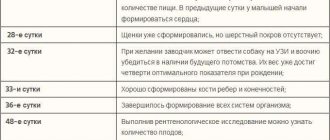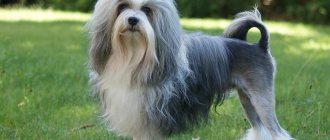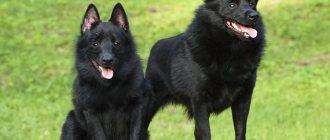Puppies, like adult Yorkie dogs, are playful and affectionate. But in order for your pet to grow up healthy and strong, vaccinations should be done. Vaccination for preventive purposes will help protect your puppy from many common infectious diseases.
Puppies are required to be vaccinated against rabies, distemper, parvovirus, hepatitis and leptospirosis. Without vaccinations, he is an unsafe animal for his owner - many incurable diseases can be transmitted from dog to person. Vaccination against rabies or another infection will not only help raise a healthy generation of pets, but the owner will also be able to feel protected.
When and how is the first vaccination given?
Its effect depends on the timeliness of vaccination. Complex preparations allow you to undergo manipulation procedures quickly and less painfully. The first vaccinations for Yorkie puppies according to the calendar are given at the age of 2 months. The drug Nobivac allows you to vaccinate your pet against several common infections at once.
Vaccination should be done in a veterinary clinic. The specialist will be able not only to perform the injection correctly, but also to examine the animal before the procedure. It is also worth remembering that vaccines can cause allergies. At the clinic, the veterinarian will be able to provide assistance to the animal and administer an antigestamine in a timely manner.
Records of vaccinations performed are included in the animal’s veterinary passport. The information must contain the name of the drug, the date of the procedure and the registration number. This data will be required when traveling with a small four-legged friend or when participating in exhibitions.
Second and subsequent vaccinations
It is done after 14 days. This is a revaccination against microscopy and trichophytosis. Vaccination at 3 months is a repeat of the first complex. It all depends on the general condition of the little pet. As a rule, this manipulation is carried out at the age of 5 months.
But in any case, revaccination is fixed every year. The animal should then be vaccinated annually.
The date of manipulation must match. Delays up to 7 days are allowed.
Optimal timing for vaccinating a Yorkie
Even if you buy a Yorkie puppy for yourself and will not show it off, vaccination is still necessary. All required vaccinations must be on schedule. Usually a puppy is purchased that has already been vaccinated. You need to find out from the breeder or veterinarian when vaccinations are given to Yorkie puppies.
Vaccination is repeated after 2 weeks. It is carried out using the same means. It is better to find out from your veterinarian what other vaccinations are needed. Usually up to a year, another revaccination and rabies vaccination is carried out. Sometimes it is recommended to vaccinate your dog against fungal skin diseases. In the future, you need to get a rabies vaccination every year; other vaccines are administered to the dog every 2-3 years according to the calendar until the age of 8 years.
Vaccination table for Yorkie dogs by age:
| Disease | Vaccination procedure | Revaccination | Subsequent vaccination | Vaccine introduction | |
| 1 vaccination | 2nd vaccination | ||||
| Rabies | 12 – 13 week | No | at 1 year | Every year | subcutaneously/intramuscularly |
| Plague | 8 – 10 week | in 3 – 4 weeks | at 1 year | Every year | subcutaneously/intramuscularly |
| Infectious hepatitis | 8 – 10 week | in 3 – 4 weeks | at 1 year | Every year | subcutaneously/intramuscularly |
| Primary viral enteritis | 8 – 10 week | in 3 – 4 weeks | at 1 year | Every year | subcutaneously/intramuscularly |
| Parainfluenza | 8 – 10 week | in 3 – 4 weeks | at 1 year | Every year | subcutaneously/intramuscularly |
| Leptospirosis | 8 – 10 week | in 3 – 4 weeks | at 1 year | Every year | intramuscularly |
| Trichophytosis | 1 – 6 months | after 10 – 14 days | at 1 year | Every year | intramuscularly |
| Microsporia | 1 – 6 months | after 10 – 14 days | at 1 year | Every year | intramuscularly |
First vaccination
The first vaccination for Yorkie puppies is given at the age of two months, 8-9 weeks after birth. This is a comprehensive vaccine against most common infections. It includes protection against enteritis, hepatitis, plague, parainfluenza, leptospirosis, and adenovirus.
Second vaccination
The second vaccination is done 2 weeks later with the same product. Yorkies are often recommended to receive additional vaccinations against microsporia and trichophytosis, as they are predisposed to these infections due to their long coat. In this case, revaccination against other diseases is delayed. It is done at 3-3.5 months.
Preparation
The doctor will tell you when to give the injection and how to properly prepare the animal for the procedures. But there are still uniform rules for preparation.
- Only healthy animals can be vaccinated. A change in behavior on the eve of the procedure should alert the owner.
- You should not immediately vaccinate a puppy that has just moved to a new home: it needs adaptation within 15-20 days.
- 10 days before the procedure, deworming should be carried out: the dose and timing are determined by the veterinarian.
Failure to deworm can significantly harm your dog.
Care after vaccination
After vaccination, you can wash your Yorkshire Terrier no earlier than a week later.
After vaccination, the Yorkie should develop an adequate response to the pathogen. Therefore, when caring for an animal, the owner must adhere to certain rules.
The dog is allowed to bathe only 7-14 days after the procedure. Otherwise, the animal may “catch” a cold.
It is important to limit your Yorkie's contact with relatives and other animals. Your pet's body is still vulnerable to viruses. A virus can live on another dog’s fur and can be easily transmitted to a newly vaccinated puppy.
All puppies aged 2-8 months are placed in quarantine for a period of two weeks.
A pathognomonic flora lives in the external environment. You can walk with your Yorkie, but it is advisable to avoid contact with grass and soil. The dog can do all the work at home, in a special tray. Walks, especially in cold weather, should be short. The dog must be wearing a special blanket.
You can’t put too much stress on a young Yorkie. It is advisable to train and train the dog later, after completing all scheduled vaccinations.
There are no specific recommendations regarding diet. They are discussed with a veterinarian individually.
Should I deworm before vaccination?
Worms are very common in dogs. It is noteworthy that babies can become infected with them in utero. Parasites can not only affect the development of puppies, but also kill them. Not all worms come out and have the same development cycle. That is why deworming is necessary. The first dose of the drug is prescribed at the age of 3 weeks and repeated every 30 days.
Advice! 10 days before vaccination, the puppy must be given a special drug that will rid the baby of possible parasites. The remedy for worms is given constantly: once every 3 months.
What does vaccination give and why should it be carried out?
Dogs also suffer from infectious diseases. The first time after birth, they retain immunity from their mother, but by 2 months it disappears. Therefore, the puppy may become infected. Such diseases in Yorkies are severe and often result in death. And some of them are transmitted to humans. To protect yourself and your pet, it is necessary to vaccinate it.
Vaccination protects against the following common infections:
- rabies is dangerous for dogs at any age, it is transmitted to humans, leading to paralysis and death;
- viral hepatitis affects the liver, nervous system, and respiratory system;
- parvovirus enteritis leads to fever and intestinal bleeding;
- carnivore plague is accompanied by high fever, convulsions, and often ends in death;
- Leptospirosis is caused by parasites and affects the gastrointestinal tract.
Even a dog that is not allowed outside is at risk.
A pet can become infected by interacting with a sick animal on the street, after being bitten, or by picking up something from the ground. Some infections are transmitted from humans; parasites can be carried on shoes.
Vaccination is not a treatment for an already sick animal. A drug is administered that contains a weakened pathogen. It does not cause disease, but stimulates the production of antibodies. Therefore, the pet will be protected from infection, even if it encounters it.
Vaccinations by age
vaccination table
| Age | Possible infection |
| 1.5 months | Enteritis, hepatitis, adenovirosis |
| 2 months | Plague, hepatitis, adenovirosis, enteritis |
| 2.5 months | Revaccination: Distemper, hepatitis, adenovirosis, enteritis |
| 5 months | Rabies |
| 6 months | Revaccination: Distemper, hepatitis, adenovirosis, enteritis |
| 1 year | Revaccination: Distemper, hepatitis, adenovirosis, enteritis |
Yorkie's well-being after the procedure
Symptoms that may be observed:
- a slight increase in temperature: general and at the injection site (in adult dogs it ranges from 37 to 39 degrees, in puppies – up to 39.5);
- apathy in behavior, drowsiness, loss of appetite;
- Locally, slight pain and even swelling may be observed.
The above symptoms are considered completely physiological and do not require additional treatment. However, more serious side effects are possible in the form of itching, general swelling, as well as diarrhea, vomiting, and convulsions. Such phenomena require immediate intervention by specialists.
There are situations when a compaction that does not dissolve for a long time forms at the injection site. Sometimes it festeres, and then an abscess forms. After vaccination, such a pathology is difficult to open on its own; it requires surgical assistance.
Lethargic Yorkie
Lethargy and fever in the first days after vaccination are normal and do not require treatment. Very rarely, post-vaccination allergies can develop: swelling of the muzzle, upset stomach. In such cases, a visit to the veterinarian is mandatory.
If your Yorkie is lethargic after the injection, then you should monitor your pet, provide him with rest and a nutritious, but light diet. If symptoms do not go away within a few days, you should contact a qualified specialist.
Vaccination Basics
Newborn puppies are protected by the immunity received from milk. After the start of independent feeding, babies are protected by their own immunity. Periodic vaccinations help to form it. Basics of vaccination:
- absolute health. Contraindications for the next vaccination should be a previous illness, a period of illness, fever, allergy symptoms, diarrhea, etc. A trip to the doctor is postponed while maintaining quarantine;
- Pregnant and lactating bitches cannot be vaccinated. The female body is subject to extreme stress. It is better to vaccinate the animal three weeks before the intended mating. If pregnancy has occurred and the vaccine has not been administered, it is left for the postpartum period. During the period of estrus, vaccinations are not recommended;
- The first vaccination is carried out strictly on time. You cannot vaccinate earlier, for example, in order to start taking your Yorkie puppy outside faster. Until the effect of antibodies from the bitch's milk has ended, the vaccine will be ineffective;
- even if the Yorkie is healthy, its condition is carefully monitored after 3 days of vaccination;
- treatment for fleas and internal parasites is carried out two weeks in advance;
- You can bathe your Yorkie 1 month before and a week after.
Important: vaccination is not a cure for the disease. The procedure involves introducing a pathogen into the body to produce antibodies. Vaccinating a weakened, unhealthy dog can be fatal.
Lump formation
This phenomenon is not dangerous if it is just swelling of the injection site. Warning factors are:
- an increase in the size of the cone,
- redness and infection
- pain and discomfort,
- purulent discharge at the vaccination site
- fever for more than 3 days.
These manifestations require contacting a doctor.
You can avoid compaction by calming your pet before vaccination, using special syringes for dogs, and administering the drug professionally and slowly.
Vaccination timing depending on age
When carrying out vaccinations, attention is paid to the shelf life of the drug and its labeling. It is recommended to trust your pets only to specialists from licensed clinics.
The general vaccination scheme looks like this:
- 8 – 10 weeks: Nobivak;
- three weeks later - revaccination with DHPPi + Nobivac Lepto and administration of Nobivac Rabies (some doctors recommend revaccination after changing teeth, but no fundamental difference in these approaches has been noticed);
- subsequently, vaccinations are carried out once a year (sometimes vaccinated once every three years).
Note: There are different vaccination procedures. To determine the timing for your pet, you should contact your veterinarian.
How much do vaccines cost?
As a rule, all veterinary clinics use the Nobivak complex vaccine, which costs about 150 rubles. Puppies are also vaccinated with Nobivak, the price of which does not exceed 200 rubles. Eurican - 170 rubles, Hexadog -330 rubles can also be used. Naturally, clinics can offer individual prices for vaccines and provide discounts on animal examinations.
Whether to vaccinate a pet at all is an individual decision. But in order for the animal to grow up healthy, you should find out what vaccinations need to be given, set a schedule and carry out full vaccination. In addition, having records of vaccinations made will allow the animal to travel with its owners and take part in exhibitions. It is worth noting that rabies vaccination is mandatory for every dog.
How much does it cost to vaccinate a Yorkie?
The cost of vaccination ranges from 400 to 1200 rubles. It is recommended to use imported products that are easier to tolerate. The cost of vaccinations can vary significantly in different clinics and cities. Using the table you can get acquainted with the most common vaccines and the average cost of vaccination:
| From what infections | Price |
| plague, hepatitis, pre-influenza, enteritis | 1100 rubles |
| plague, hepatitis, enteritis, parainfluenza, leprospirosis | 1400 rubles |
| plague, hepatitis, enteritis, leptospirosis | 900 |
| common infections + rabies | 1000 |
| rabies | 900 |
Vaccinations are a necessary measure to protect your pet from infections. By following the vaccination schedule and following all the veterinarian's recommendations, you can be confident that your Yorkie will remain healthy. Having a veterinary passport will allow the pet to travel with its owner and participate in exhibitions.
Dear readers, when I, your beloved York, wrote this article (of course I wrote it, what did you think?), I tried very hard! Write your impressions in the comments, and on New Year's Eve 2021 (I hope it will come, no matter what!) I will give the person who writes the best comment a great gift for your Yorkie!
SIMILAR ARTICLES
CARRY FOR YORKSHIRE TERRIER
Every happy Yorkie owner wants to spend as much time as possible with his furry dog. where would you...
YORKSHIRE TERRIER: HISTORY OF THE BREED, ORIGIN, FAMOUS YORKIES
Every day, charming dogs with luxurious fur are becoming more and more popular, their aristocratic appearance creates...
HOW TO TRAIN A YORKSHIRE TERRIER TO NAPPY
Diaper training a Yorkshire Terrier is very helpful for people with busy daily routines, so as not to...
8 INTERESTING FACTS ABOUT YORKIES
It is fairly widely known that dogs have been man's best companions for as much as 33,000 years.…
TOYS FOR THE YORKSHIRE TERRIER: HOW TO CHOOSE
Yorkshire Terriers are very inquisitive and love to chew on everything. So that shoes and furniture are not damaged, and the pet...
YORKSHIRE TERRIER - HISTORY OF THE BREED
Today the Yorkshire Terrier is one of the most popular and famous dog breeds, but few people think about…
HOW TO CARE FOR YOUR YORKSHIRE TERRIER
For many people, choosing a Yorkshire Terrier as a pet is based on its small size...
SHAMPOO FOR YORKIE. SECRETS OF SUCCESS
To understand how shampoo works and which shampoo to choose for your Yorkie, we need to understand...
YORKSHIRE TERRIER - DESCRIPTION AND CHARACTER OF THE BREED
More and more people are choosing Yorkshire Terriers as pets. But what did this breed deserve...
YORKSHIRE TERRIER – COMPANION DOG
In terms of popularity, the Yorkshire Terrier breed has not been losing ground for many years. They are willingly turned on...
CLOTHING FOR YORKIES: BUY OR MAKE YOUR OWN HANDS
Yorkshire Terrier is a decorative breed. These dogs are thermophilic, and since they live all year round in…
Does vaccination depend on the breed?
How many days before vaccination should a cat be given anthelmintic?
Every pet breeder should know: no matter what breed the dog is - German Shepherd, Spitz, Fox Terrier, Husky or Yorkie, puppies must be vaccinated according to age; a table of dates is available in any veterinary hospital. The main criteria for vaccination are the weight of your four-legged friend and his well-being.
An owner's care for his pet begins with careful attention to his health. It is mandatory to vaccinate your beloved dog. At the same time, it does not matter at all where the dog is kept - in an apartment, an enclosure or a country house.
Vaccination rules
Preventive injections should be given from an early age, without waiting until the Yorkie becomes an adult. Recommendations to be followed:
The pet must be completely healthy. Otherwise, vaccination of a fragile organism can cause complications, even death. It is not aimed at treatment, but contains a small amount of a pathogenic pathogen.
When it enters the body, it causes a reaction in the form of antibody production, which helps repel future viral attacks. In case of recent illness, you should wait 2-3 weeks after recovery for complete recovery. It is important to stick to a set schedule.
The vaccine should not be administered to a pregnant animal. The dog is not sick, but is under high stress. You cannot vaccinate without waiting for the body to recover after childbirth and feeding the offspring. It would be correct to vaccinate the bitch 15-20 days before mating to protect her from serious diseases during pregnancy.
Puppies cannot be vaccinated from birth. They receive antibodies from mother's milk, their activity remains even after switching to a normal diet and gradually ceases to act by the age of two months.
- By this time, the puppy’s body has developed its own immunity. If you give a prophylactic injection too early, it may not work, which will subsequently lead to infection.
For the first and subsequent procedures, the same product is used. When purchasing, you need to check its expiration date and be sure to read the instructions before use. It is necessary to study possible side effects and contraindications. Store the drug in accordance with the instructions, otherwise it loses its properties.
- 10-14 days before the prophylactic injection, deworming is done, otherwise the vaccine will not work. During the day before vaccination, the animal should not be bathed.
Before routine vaccination, you need to monitor the dog’s condition: it should be active, as usual, and eat with appetite. You should check your nose; it is normally cold and wet. The temperature is checked regularly; it reaches 39.5° in healthy puppies, 37-39° in adults.
What is a vaccine, how does it work and why is it needed?
Every day a living organism has to interact with millions of bacteria, viruses and fungi. They surround people and animals everywhere: on the surfaces of objects, in the air, in water. Among the huge number of microorganisms that you come into contact with, there are a huge number of hostile ones that can cause serious illnesses.
Dog vaccination
The immune system and its role in the life of the body
However, nature has taken care of a reliable shield that every second protects the body from the harmful effects of pathogenic viruses and bacteria, providing humans and animals with an immune system. Thanks to the immune system, the body produces specific antibodies that resist infection caused by pathogenic microorganisms. In addition to the protective function, the immune system helps remove its own damaged or dead cells, as well as protein, lipid, and polysaccharide fragments foreign to the body.
Effect of vaccination on the immune system
In order for the body to develop antibodies that provide resistance to the disease, its pathogen is introduced into the dog’s body. Don't be alarmed: the pathogens contained in the vaccine are weakened or killed. Essentially, a controlled infection of the pet occurs in order to stimulate the immune system response in the form of antibody production. As a rule, the dog does not experience any discomfort.
What does the vaccine look like?
Vaccine classification
Vaccines are classified according to the state of the microorganisms administered and their number. In other words, vaccines can be live or killed, monovalent or polyvalent:
- Live vaccines contain live, but significantly weakened microorganisms. The introduction of such microorganisms, limited in their capabilities, into the dog’s body will allow the immune system to develop the antibodies necessary for the formation of immunity.
- Killed vaccines include lifeless microorganisms to which the immune system is able to respond by producing the necessary antibodies. It is believed that a killed vaccine is less preferable than a live one, although it is better tolerated by the pet.
- The term “monovalent vaccine” means the presence in 1 vaccine of the causative agent of a single disease, while a polyvalent vaccine contains a complex of causative agents of several diseases. It is allowed to contain up to 7 pathogens in this form of vaccine. Polyvalent vaccines are usually prescribed to adult dogs whose immune systems have already been developed. In any case, a specialist decides which vaccine to vaccinate a dog with.
Note! Polyvalent vaccines are much worse tolerated by dogs, since the pet’s body has to resist several diseases at once.
Post-vaccination period
Owners also need to know about the rules of care after vaccination. If you understand how a puppy should feel, it is easy to recognize serious complications and take action in time. After the first vaccination, it is not advisable to take your Yorkie outside. Immunity is formed within 1.5-2 weeks.
How long after vaccination can you bathe your dog?
Do not wet the injection site for 3-5 days. You can bathe the puppy no earlier than a week later; it is better to wait until the mark completely disappears. If complications are observed, you need to wait for the pet to fully recover.
Veterinarians recommend waiting a two-week quarantine period, which gives the dog’s body time to adapt, then you can go for a walk. It is important to protect the puppy from drafts, dampness, and temperature changes.
Feeling normal
Yorkies often feel worse after vaccination. The following signs are considered normal:
- slight increase in temperature;
- drowsiness;
- stool liquefaction;
- refusal to eat;
- anxiety.
These symptoms should subside within a few days. If the puppy does not feel better, you need to take him to the vet.
If the puppy is lethargic after vaccination, does not play and sleeps a lot, this is normal. It is necessary to provide the pet with rest and adequate nutrition. In 1-2 days he will become cheerful and active again.
Lump formation
A lump often forms at the injection site. This is a normal post-vaccination reaction. It can last 5-7 days. It usually goes away on its own, but you can apply iodine to it twice a day. If the injection site itches, you need to make sure that the puppy does not scratch it, as it can cause an infection.
Procedure
The procedure must be performed by a doctor. This is especially true for puppies. Improper vaccination can lead to disastrous consequences. Before starting the procedure, the veterinarian must measure the temperature, conduct a visual examination of the mucous membranes, and listen to the rhythm of the heartbeat.
After an illness, it is better to get tested to make sure that all indicators are back to normal.
Especially vaccinations up to a year, against rabies. In Eastern Europe, the situation regarding this deadly disease is unfavorable. Cases of encounters with infected wild animals are recorded every now and then. Therefore, this procedure is annual.
Sequencing:
- Using a sterile syringe, inject the diluent into the vaccine vial.
- Shake the mixture vigorously until smooth.
- Take the entire composition without any residue into the syringe.
- Disinfect the injection site.
- Fix the dog and administer the vaccine.
- Treat the injection site.
If you have doubts about the status of the clinic, it is better to contact a state hospital. They vaccinate against rabies for free, with the necessary registration.
If an allergy has already occurred, the dog is given an antihistamine 1.5 hours before vaccination. If your veterinarian doesn't know about the allergy, be sure to let him know about your pet's allergies.
There is an opinion that dogs that have reached 8-9 years of age do not need to be vaccinated. They have developed a strong immunity to diseases. This is wrong. Cases have been recorded of older dogs becoming infected with enteritis, plague and other diseases dangerous for their age. You should not expose your pet to the risk of infection.
Before vaccinations, there is one more simple procedure - deworming. To make it more clear, a Yorkie puppy needs to get rid of worms. The first time this is done 2 weeks before vaccination. If you do not carry out this procedure, then vaccination may simply be in vain. Next, the removal of worms is carried out at the 5th and 10th weeks.
For the convenience of our users, below is a table of vaccinations for Yorkie puppies.
Vaccination table for a Yorkshire Terrier puppy
Rabies injections
Do it no earlier than 12 months, because it is difficult for Yorkies to tolerate: it has a toxic effect, allergies, and can affect development. Eurikan is often used, providing protection for several years.
But veterinarians recommend vaccinating your pet annually. It is carried out by specialized clinics that have been licensed to provide this service.
We suggest you familiarize yourself with how much dry food a cat needs per day
You should pay attention to the storage of the vaccine; according to the rules, it is kept in the refrigerator.
If your pet will participate in exhibitions, all scheduled vaccinations must be carried out in public clinics. It is their seal in the veterinary passport that is taken into account during the exhibition.
After vaccination
Administration of the drug may cause the following symptoms:
- Temperature increase.
- Decreased activity.
- Poor appetite.
Restrictions for unvaccinated animals
Some owners doubt whether their Yorkie should be vaccinated. After all, often these dogs are bought as indoor pets, they are not exhibited, they are not taken outside. But veterinarians warn that all pets need to be vaccinated.
Some regions have introduced administrative liability for lack of rabies vaccination. This also applies to decorative breeds.
Only a vaccinated animal can participate in an exhibition or travel with its owner on public transport. Without vaccination, Yorkies are also not allowed to breed. After the first vaccination, the dog is issued a veterinary passport, where all the information is entered.
Vaccination preparations
Breeders and owners of Yorkies trust foreign vaccines more. It is believed that they are less likely to cause allergic reactions and are easier to tolerate.
We invite you to read: How to train a Bichon Frize dog
The drugs require storage conditions - low temperatures.
After purchasing a bottle, it is sent to the refrigerator. Failure to comply with storage rules will lead to loss of effectiveness of expensive products.
Experienced breeders of Yorkshire terrier dogs advise using drugs from foreign manufacturers to vaccinate their pets. Typically, dog owners prefer vaccines with the following names:
- Eurican;
- Hexadog;
- Nobivak.
These drugs have earned their popularity due to their high quality, so they are very easily tolerated by animals.
To ensure that your beloved Yorkie is always healthy, in addition to good nutrition, you should also remember about vaccination. Don't neglect it, get your vaccinations on time and your pet will always be full of strength and energy.
Grafting Basics
Once born, a Yorkie puppy receives immunity through its mother's milk. The barrier that stops the penetration of infections into the young body remains for some time after the end of the lactation period. But gradually it is depleted, giving way to independently developed immune defense.
While the puppy is with its mother, it receives immunity from her milk.
Important! Vaccination is not a cure.
Vaccination refers to the causative agent of a pathological condition. It “trains” the dog’s body to resist diseases. Vaccination gives a powerful load. If the animal's immune system is weakened, death is inevitable.
